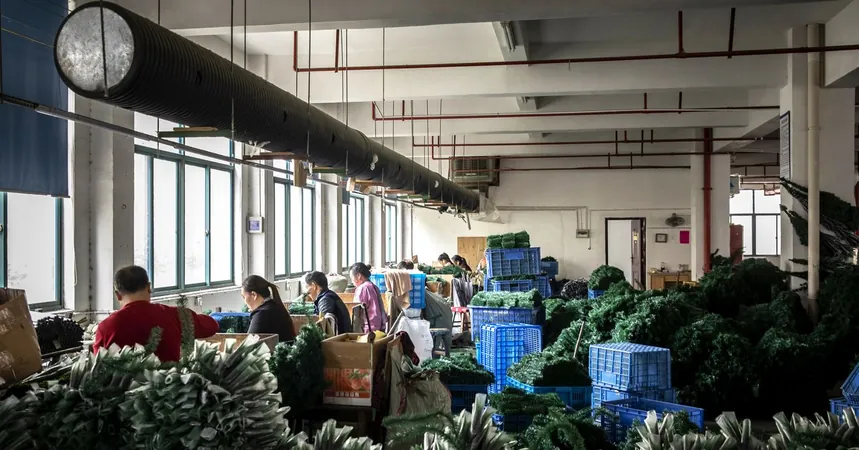
How Trump's Trade War Could Backfire, Strengthening China's Global Influence
2025-04-10
Author: Wai
Trump's Tariffs: A Double-Edged Sword
President Donald Trump's aggressive tariffs on Chinese imports are wreaking havoc across the global marketplace, forcing manufacturers, retailers, and small businesses to grapple with a steep rise in costs. The situation escalated dramatically when Beijing retaliated with its own set of tariffs, pushing the effective rate on many Chinese products to a staggering 145%, a significant leap from the 34% proposed just a week earlier.
China's Defiant Stance
Despite the looming economic challenges, Beijing remains steadfast, adopting a defiant posture rather than conceding to Trump's demands. The narrative surrounding China's manufacturing capabilities is evolving, and experts believe that escalating tensions with the U.S. could actually enhance China's soft power on the global stage. Liu Pengyu, a spokesperson for the Chinese embassy in Washington, emphasized, "If the U.S. insists on pursuing this trade war, China's response will be unwavering."
Changing Perceptions About China
Historically, the U.S. justified its trade policies by highlighting China's spotty human rights record and intellectual property theft. However, China's tech advancements are hard to ignore, with home-grown brands and significant strides in industries like artificial intelligence. Even as American authorities face scrutiny for their own human rights issues, the positive image of Chinese innovation is starting to take root, shifting perceptions.
Public Sentiment in China
Chinese citizens largely seem supportive of their leadership's assertiveness against the U.S., though reliable polling data is scarce. As tariffs kicked in, the government took measures to control the narrative on social media, censoring specific tariff-related hashtags while allowing others that mock the U.S. to flourish.
The True Impact of Tariffs on American Businesses
Claimed by the Trump administration to boost U.S. manufacturing and job creation, the reality is different for many American small business owners. TikTok videos reveal a different story, as entrepreneurs share their frustrations about the necessity of Chinese manufacturing. One CEO lamented, "Working with U.S. suppliers is terrible compared to those in China."
A Shifting Cultural Landscape
TikTok and other platforms have fostered a new understanding of China's manufacturing landscape, allowing Western consumers to see the human side of the industry. Posts from Western influencers showcasing their relationships with Chinese workers highlight a complex and evolving dynamic, signaling a shift in attitudes historically marred by stereotypes.
A New Era of Global Dynamics?
As American allies like Canada begin to express frustration with the shifting trade landscape, thought leaders are predicting a changing tide in global hegemony. Many observers now contemplate whether the coming decades will indeed belong to China, challenging the long-held belief in American exceptionalism.
Rising Soft Power Amidst Economic Turbulence
The recent fallout from Trump's sweeping tariffs has marked a critical moment in U.S.-China relations, with high-profile social media influencers providing a glimpse into an 'unfiltered' China. Even while these developments paint a more favorable picture of China's influence, the economic ramifications are dire. Trade disruptions are causing American businesses to feel the pinch, mirroring the uncertainties facing Chinese manufacturers.
The Future Remains Unclear
As these economic tensions grow, the trajectory remains uncertain for both nations. For China, the potential to solidify its global standing is juxtaposed against domestic economic challenges, including millions facing uncertainty in a faltering job market. As the world evolves, the vacuum left by declining American soft power invites questions about who will rise to fill it.





 Brasil (PT)
Brasil (PT)
 Canada (EN)
Canada (EN)
 Chile (ES)
Chile (ES)
 Česko (CS)
Česko (CS)
 대한민국 (KO)
대한민국 (KO)
 España (ES)
España (ES)
 France (FR)
France (FR)
 Hong Kong (EN)
Hong Kong (EN)
 Italia (IT)
Italia (IT)
 日本 (JA)
日本 (JA)
 Magyarország (HU)
Magyarország (HU)
 Norge (NO)
Norge (NO)
 Polska (PL)
Polska (PL)
 Schweiz (DE)
Schweiz (DE)
 Singapore (EN)
Singapore (EN)
 Sverige (SV)
Sverige (SV)
 Suomi (FI)
Suomi (FI)
 Türkiye (TR)
Türkiye (TR)
 الإمارات العربية المتحدة (AR)
الإمارات العربية المتحدة (AR)